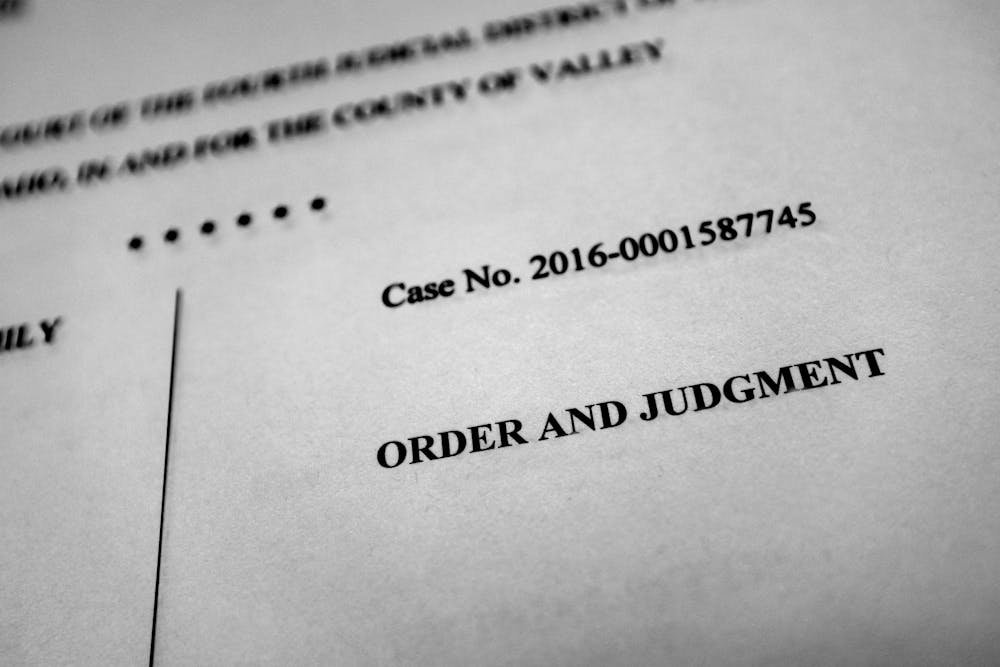Schedule Your Consultation Today!
866-323-7529
Acting now means taking the first step towards resolving your case quickly and efficiently. Let’s tackle your legal challenges together—sooner rather than later.
- Schedule Your Consultation Today!
- Key Takeaways
- What is Contempt of Court?
- How Do You Prove Contempt?
- What to Do If You Are Accused of Contempt of Court
- Is Contempt of Court a Felony?
- Penalties for Contempt of Court
- Why Work With Cordell & Cordell
- We Help Keep Your Case in Order
- Frequently Asked Questions
- A Partner for You

Lawyers for Contempt of Court in Divorce
- Schedule Your Consultation Today!
- Key Takeaways
- What is Contempt of Court?
- How Do You Prove Contempt?
- What to Do If You Are Accused of Contempt of Court
- Is Contempt of Court a Felony?
- Penalties for Contempt of Court
- Why Work With Cordell & Cordell
- We Help Keep Your Case in Order
- Frequently Asked Questions
- A Partner for You
Key Takeaways
- Contempt of court occurs when an individual willfully ignores, disrespects, or disobeys a court order.
- There are two types of contempt: civil contempt and criminal contempt.
- Individuals found in contempt of court can suffer penalties if an actual violation is proven.
- If you are accused of contempt of court during a divorce proceeding or other family law issue, you should immediately speak with a skilled and knowledgeable attorney.
- Cordell & Cordell are aggressive family law attorneys who champion and advocate client’s rights and aren’t afraid to take our client’s cases to trial to give them their day in court.

Contempt of court can only come into play after a court has issued judgments, orders, or decrees to govern the behavior of the parties, which it can do at any point during the divorce proceedings. Once a court has issued such orders, it is important for you to observe them to the best of your ability and, at the same time, to take note of any potential violations on the part of your estranged spouse, ex-spouse, or former partner.
Courts have been known to take offense when a party disregards their orders. Need help navigating contempt proceedings? Call Cordell & Cordell for legal advice at 1-866-323-7529.
What is Contempt of Court?
Contempt of court typically refers to a willful action that disturbs, disrespects, or disobeys the orders or dignity of the court, judge, or other participants.
How Do You Prove Contempt?
If an attorney and their client can produce evidence that their opponents have willfully disregarded a court decree, then they can “make a motion” or “move” for a contempt of court ruling.
To find a party guilty of contempt, the court must determine:
- An actual violation of a court order (e.g., a custody order, non-payment of support obligations, or any other terms of your divorce) occurred.
- The accused had the ability to comply with the court order in their family law case.
- Alleged contemnor intentionally put themselves in a position to be unable to comply with court order.
It is then up to the accused to present evidence that he or she could not comply or that it was an “honest mistake.”
What to Do If You Are Accused of Contempt of Court
If you’re accused of contempt of court, you want to act quickly. Do not discuss this accusation with anyone else until you consult with an attorney because claims of contempt might not actually be contempt. Your lawyer can examine the terms of the divorce decree, evaluate your behaviors, and ascertain whether the accusation has merit.
If the claim is a legitimate claim of contempt, steps can be taken to mitigate liability, depending upon the claimed contemptuous behavior. To defend yourself, your family lawyer can take the following defensive approaches.
- Present a case to show you were unaware your behavior was contemptuous.
- Show reasons why your actions were done out of necessity or self-defense.
- Have the contempt charges reduced to a lesser offense.
- Show the words you used have First Amendment protections (only if the contempt is based on your words, not conduct).
If a court holds you in contempt, you will have the opportunity to explain yourself. If you are found guilty, a formal order will be issued outlining this finding and whether the finding is criminal or civil contempt.
Is Contempt of Court a Felony?
Felonies are the most serious of criminal charges, and contempt charges are generally lesser serious offenses. Depending upon state laws, a court will typically deem contempt a misdemeanor or lesser offense, such as an infraction or violation. There are two tiers of contempt, criminal and civil.
Criminal Contempt
A court may find an individual guilty of criminal contempt of court if the person interferes with a court’s administrative proceedings or is disrespectful to the court. This contempt can be direct or indirect.
- Direct criminal contempt occurs inside of a courtroom with the individual disregarding a court order.
- Indirect criminal contempt occurs outside the courtroom when the person is non-compliant with an order.
- Criminal contempt often results in a form of punishment to deter the individual from their behaviors or actions in the future.
Behaviors falling into the criminal contempt category include yelling in court, blatantly disregarding an order, or disrupting court proceedings in other ways.
Civil Contempt
If a person disobeys a court order, such as failing to pay child or spousal support or adhering to other conditions set forth by a court, they could be held in civil contempt of court.
- Civil contempt is less about behavior in relation to disrespecting the court.
- A charge of civil contempt is often a result of a person not following a court order, such as refusing to make child support payments or violating the terms of the order relating to a child custody case.
- A court might charge an individual with civil contempt as a way to get them to comply and change the behavior or action putting them in contempt.
Generally speaking, there are two types of civil contempt: coercive and compensatory.
Penalties for Contempt of Court

If the court goes on to rule for contempt, then it can hand down new or modified decrees binding the party it has found to be in contempt.
The consequences for contempt of court will be dependent upon state law and can even vary among counties within a state. If an individual is found in contempt, they could receive consequences. For this, “remedy” is a better word than “penalty.” The most common remedies include:
- A monetary fine
- Jail time
- Custody and visitation changes
- Have certain pleadings struck if a case is pending
- Order to pay court costs and attorney’s fees for the other party
- A combination of the above
Incarceration is rarely invoked but is frequently requested. Consequences are usually given to encourage the contemptuous party to cure or resolve their contemptuous behavior. It is not strictly a penalty.
The “usual outcome” depends upon the contempt claim. Even then, there is no usual outcome. For example, if the contempt claim is for non-payment of child support, payment of the arrearage with interest and/or all or a portion of the attorney’s fee and/or incarceration are available remedies.
Why Work With Cordell & Cordell
Cordell & Cordell is a national family law firm dedicated to helping fight the biases they may face in the U.S. legal system. Our divorce attorneys are acutely aware of these biases in custody and domestic cases. While we understand these biases often aren’t intentional, nonetheless, they exist.
Our legal team is tenacious, and we aren’t afraid to take our clients’ cases to court. Since 1990, our clients have chosen Cordell & Cordell because they know they’ll have an attorney who is a strong advocate and isn’t afraid to champion their rights.
Hear From Our Clients
“Claire handled things with grace and professionalism. She got what I wanted and truly paid attention to detail.” — Michael B.
“[Cordell & Cordell] has it figured out and streamlined. I liked that I could see everything on the website including documents I had turned [in]. Keri was great. She was attentive and responsive. She was on top of everything.” — Richard G.
We Help Keep Your Case in Order
The experienced divorce lawyers at Cordell & Cordell provide intelligent, aggressive representation to clients in divorce cases, child custody agreements, alimony, marital property division, and other family court issues. We are a community of talented legal professionals who prioritize growth and success in all our life roles. Together, we provide our clients with the quality of representation we would expect for ourselves.
If you are facing non-compliance of a court order or any kind of contempt action, we can help. To schedule a consultation to discuss your legal options, call Cordell & Cordell at 1-866-323-7529 or, if you prefer, fill out our online contact form. We also offer other supportive resources, including podcasts, eBooks, and town halls.
Frequently Asked Questions
Contempt of court typically refers to a willful action that disturbs, disrespects, or disobeys the orders or dignity of the court, judge, or other participants.
If an attorney and their client can produce evidence that their opponents have willfully disregarded a court decree, then they can “make a motion” or “move” for a contempt of court ruling.
To find a party guilty of contempt, the court cannot simply conclude that the accused party did not act in accordance with the decree. The court must also conclude that the accused party did have the ability to comply and therefore violated the decree both deliberately and without good reason.
If the court goes on to rule for contempt, then it can hand down new or modified decrees binding the parent whom it has found to be in contempt.
It is then up to the accused to present evidence that he or she did not have the ability to comply or that it was an “honest mistake.”
Technically, a contempt action is appropriate anytime a party “contemptuously” violates any provision of the decree. As a practical matter, however, the violation or violations should be significant.
The evidence for a contempt ruling often does exist, and if you and your attorney can produce it, you will substantially improve your case. In fact, your attorney will often file a motion of contempt in tandem with a motion to modify.
To stimulate compliance, the court has a whole range of remedies that you can request, ranging from a simple warning to incarceration to attorney’s fees to compensatory custody time (and more).
In other words, contempt of court can be a very powerful tool. It simply requires evidence.
Bear in mind that an initial contempt is a civil (not a criminal) offense, so the court can only hand down orders designed to stimulate your wife’s compliance, not simply to punish her.

Written by Joseph E. Cordell

Joseph E. Cordell is the Principal Partner at Cordell and Cordell, P.C., which he founded in 1990 with his wife, Yvonne. Over the past 25 years, the firm has grown to include more than 100 offices in 30 states, as well as internationally in the United Kingdom. Mr. Cordell is licensed to practice in the states of Illinois and Missouri and received his LL.M. from Washington University in St. Louis, Missouri. Joseph E. Cordell was named one of the Top 10 Best Family Law Attorneys for Client Satisfaction in Missouri.
Recent Articles










